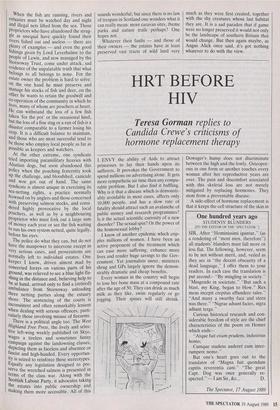HRT BEFORE HIV
Teresa Gorman replies to
Candida Crewe's criticisms of hormone replacement therapy
I ENVY the ability of Aids to attract princesses to lay their hands upon its sufferers. It provokes the Government to spend millions on advertising alone. It gets more sympathetic air time than any compa- rable problem. But I also find it baffling. Why is it that a disease which is demonstr- ably avoidable in most cases, affects only 10,000 people, and has a slow rate of fatality should attract such an avalanche of public money and research programmes? Is it the actual scientific curiosity of a new disorder? The sexual spin? Or the power of the homosexual lobby?
I know of another epidemic which crip- ples millions of women. I have been an active proponent of the treatment which can ease more suffering, enhance more lives and render huge savings to the Gov- ernment. Yet journalists sneer, ministers shrug and GPs largely ignore the demon- strably dramatic and cheap benefits. Every woman in the country will begin to lose her bone mass at a compound rate after the age of 50. They can drink as much milk as they like, swim regularly or go jogging. Their spines will still shrink. Dowager's hump does not discriminate between the high and the lowly. Osteopor- osis in one form or another touches every woman after her reproductive years are over. The pain and discomfort associated with this skeletal loss are not merely mitigated by replacing hormones. They stem from a preventable disease.
A side-effect of hormone replacement is that it keeps the cell structure of the skin in
good condition. Without it, wrinkles en- velop us all much sooner. We get chicken's necks, crow's feet and our hair thins out. High-minded media people imply that this is why women are interested in the treat- ment and they ridicule it as pure vanity and lacking 'a certain dignity' to use Candida Crewe's words (The Spectator, 29 July).
At the menopause every woman loses her hormonal equilibrium. It ruins mar- riages and drives husbands out to find new partners. This sexual sadness is uncata- logued but plainly demonstrated in divorce statistics. Replacing hormones cannot re- new your love for someone, but it can bring back the missing pleasure and self- confidence to a healthy relationship. Yet marriage guidance counsellors, I have been amazed to find, rarely mention it to their patients although the treatment has been around for over 40 years.
No man can understand the embarrass- ment which goes with the sudden rise in temperature (causing flushing) followed by waves of exhaustion which occur at this time and may last for a decade or more. We spend a fortune on new beds, old potions, new diets and sleeping pills. Tran- quillisers are the largest single drug item in the budget of the Health Service and mature women are their biggest customers. Replacing hormones completely resolves this problem. It saves lives, marriages, careers, families, employees and souls. Isn't it amazing that the health service does nothing to promote information about it?
Replacing hormones is no more artificial than giving insulin to a diabetic or growth hormones to a child whose body has failed to produce them. If you think I am exaggerating or deluded or excessive in my zeal, I challenge you to correct the scien- tific papers which endorse everything I say about its therapeutic benefits. It works, and it costs a modest £1 a week to prescribe. But now that more women are asking for it, doctors increasingly refuse to prescribe it for more than a few months
when five to ten years of treatment are needed to mitigate the worst effects. Last year, 24,000 older women underwent hip surgery, which costs the NHS an average of £2,700 per operation. A third of all hospit- al beds are occupied by women with menopausally related fractures, heart attacks or strokes or senile dementia. Don't you think we have got our priorities wrong?
There really is no excuse for the indiffer- ence of the medical profession, much less the Health Service bureaucracy. If you don't trust me, ask any working gynaeco- logist. Ask the Americans — there four out of five women take it — or ask the Germans. At a recent feminist conference in Munich my tentative reference to the effects which HRT could have on the role of older women in the labour market was greeted with astonishment. In Germany it seemed every woman takes it for granted.
But doesn't HRT cause cancer? No, it doesn't. But hasn't it been demonstrated that HRT recipients do get cancer? Yes, they do. And so do dog lovers, joggers, redheads and tall people. Women receiv- ing HRT have a better chance of avoiding some of the problems which might other- wise kill them in their 50s, like heart attacks, strokes and fatal hip fractures. If they live longer they will, like the rest of us, be open to the risk of other disorders, cancer included. Surely women should be free to make this decision for themselves?
People who survive heart or kidney transplants run an even greater risk. Their operations throw enormous strain on other organs, their anti-rejection therapy can cost £1,000 a month for the rest of their lives, which in any case tend to be much shorter than a natural span. Yet no one suggests that people should not be offered this treatment on the grounds of costs or side-effects.
The politician in me tries to apply political _ insights to this whole paradox. Aids has the advantage of being a novelty. The menopause has always been with us and women have been expected to grin and bear it. This, together with regular cancer scares, has nourished inertia towards it.
The National Health Service, as others have observed before me, is nothing of the sort. It is a service which nurtures the medical profession and thrives on disease and expensive, dramatic treatments. HRT is plain and simple and almost self- applicable. It is inevitable therefore that those of us who advocate it should come up against a brick wall of indifference.
But if I am right, surely some doctors must have been converted? Yes, they have. More recently trained ones are more open to it and women doctors have a slight predisposition to understand. Those medics who have seen the light, like me, usually become evangelists for it.
Perhaps the changes in the labour mar- ket may yet come to the rescue of women. The Amarant Trust which I have set up to draw attention to the problem is deluged with requests for information. As more companies come to rely on re-cycled, older women to fill jobs left vacant by teenagers, so more of them are giving us support in spreading the word. The market may yet fill the gap left by an indifferent public service where priorities are dictated not by the pressures of supply and demand but by pressure lobbies.
I have nothing but sympathy for Aids victims, but I do wish that the Government would spend a fraction of the resources devoted to it to the infinitely wider and more curable problems experienced by women as they approach the final third of their lives.
The Amarant Book of HRT by Teresa Gorman and Dr Malcolm Whitehead has recently been published by Pan Paper- backs, price £3.99. Available by telephone – 01-200 0200, proceeds to the Amarant Trust research fund.



















































 Previous page
Previous page